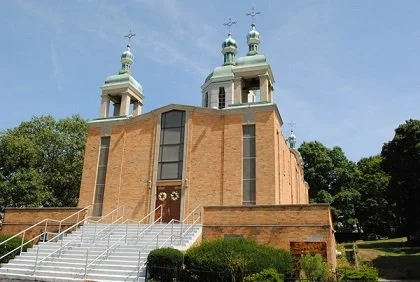David Warsh: What Putin had hoped in assaulting Ukraine
St. Andrew Ukrainian Orthodox Church in Boston.
SOMERVILLE, Mass.
Two days into Russia’s invasion of Ukraine, the dispatch from Russia’s state-owned news service seemed to reflect Vladimir Putin’s innermost reasoning.
A new world is coming into being before our very eyes. Russia’s military operation has opened a new epoch…. Russia is recovering its unity – the tragedy of 1991, this horrendous catastrophe in our history, its unnatural caesura, has been overcome. Yes, at a great price, yes through the tragic events of what amounts to a civil war, because now for the time being brothers are shooting one another… but Ukraine as anti-Russia will no longer exist.
Instead, the Novosti account continued, the Great Russians, the Belarusians and the Little Russians (Ukrainians) would come together as a whole – a reconstituted Russian Empire. Putin had undertaken the “historic responsibility” of reunification upon himself “rather than leaving the Ukrainian question to future generations.”
The pronouncement was quickly taken down, according to Jonathan Haslam, Kennan Professor at the Institute for Advanced Study, in Princeton, N.J., describing Putin’s Premature Victory Roll in early March. It wasn’t just the over-optimism that rendered it embarrassing. It was too transparent. The goal of reunification superseded Putin’s usual complaint about the threat to Russia posed by NATO expansion.
I was broadly sympathetic to Putin after 1999, when he published his essay on Russia in the Twenty-First Century as an appendix to his First Person interview in 2000, upon taking office. I overlooked the Second Chechen War. I began paying attention after he criticized the U.S. for its invasion of Iraq in a speech in Munich, in 2007. Even after Putin’s seizure of the Crimean Peninsula, in 2014, he seemed to be within his rights, though barely. Russia had a historic claim on the peninsula on which its Black Sea naval base in Sebastopol in situated, I reasoned.
No more. Last week I re-read Putin’s article from last August, On the historical unity of Russians and Ukrainians. Then I read When history is weaponized for war, historian Simon Schama’s scathing criticism of it, When the Pope sought to give Putin an excuse for his invasion, in an interview with an Italian newspaper earlier this month, asserting that NATO had been “barking at Russia’s door,” it rang hollow. Nobody is talking about a Morgenthau Plan for Russia after the war in Ukraine, but nobody is talking about a Marshall Plan, either. It has options – a stronger alliance with India? But regaining its reputation in Europe looks harder than ever.
NATO’s long-term strategy of “leaning-in” seems to have worked. Putin may or may not have cancer, as a report suggested yesterday in The Times of London, but something has seriously wrong gone wrong with the man. Haslam cites Shakespeare. Putin has waged a war he cannot win. He is cementing in place the fence around him of which he complained.
Consider that his war on Ukraine has persuaded Finland and Sweden to seek to join NATO.
David Warsh, a veteran columnist and an economic historian, is proprietor of Somerville-based economicprincipals.com, where this essay first ran. He’s the author of, among other books, Because They Could: The Harvard Russia Scandal (and NATO Enlargement) after Twenty-Five Years.
